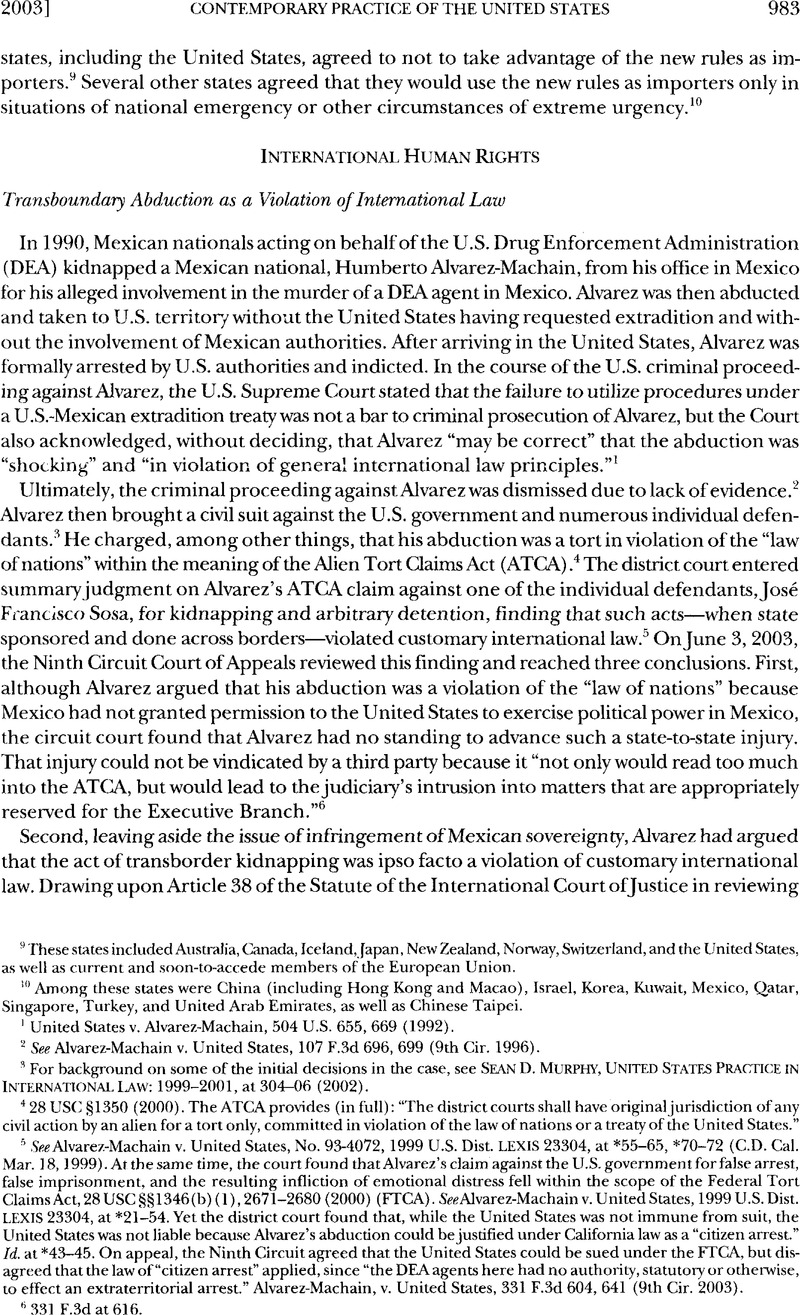No CrossRef data available.
Article contents
Transboundary Abduction as a Violation of International Law
Published online by Cambridge University Press: 10 March 2017
Abstract

- Type
- Contemporary Practice of the United States Relating to International Law
- Information
- Copyright
- Copyright © American Society of International Law 2003
References
1 United States v. Alvarez-Machain, 504 U.S. 655, 669 (1992).
2 See Alvarez-Machain v. United States, 107 F.3d 696, 699 (9th Cir. 1996).
3 For background on some of the initial decisions in the case, see SEAN D. MURPHY, UNITED STATES PRACTICE IN INTERNATIONAL IAW: 1999-2001, at 304-06 (2002).
4 28 USC §1350 (2000). The ATCA provides (in full): “The district courts shall have originaljurisdiction of any civil action by an alien for a tort only, committed in violation of the law of nations or a treaty of the United States.“
5 See Alvarez-Machain v. United States, No. 93-4072, 1999 U.S. Dist. LEXIS 23304, at *55-65, *70-72 (CD. Cal. Mar. 18,1999). At the same time, the court found that Alvarez's claim against the U.S. government for false arrest, false imprisonment, and the resulting infliction of emotional distress fell within the scope of the Federal Tort Claims Act, 28 USC §§1346(b) (1), 2671-2680 (2000) (FTCA). SeeAlvarez-Machain v. United States, 1999 U.S. Dist. LEXIS 23304, at *21-54. Yet the district court found that, while the United States was not immune from suit, the United States was not liable because Alvarez's abduction could be justified under California law as a “citizen arrest.” Id. at *43-45. On appeal, the Ninth Circuit agreed that the United States could be sued under the FTCA, but disagreed that the law of “citizen arrest” applied, since “the DEA agents here had no authority, statutory or otherwise, to effect an extraterritorial arrest.” Alvarez-Machain, v. United States, 331 F.3d 604, 641 (9th Cir. 2003).
6 331 F.3dat616.
7 M a t 617-20.
8 Id. at 620.
9 GARes. 217 (Dec. 10, 1948).
10 Dec. 16, 1996, 999 UNTS 171. By contrast, the Eleventh Circuit Court of Appeals in 2002 held, in part, that the Covenant is not self-executing and “does not create judicially-enforceable rights.” United States v. Duarte- Acero, 296F.3d 1277 (11th Cir. 2002); see also United Statesv. Matta-Ballesteros, 71 F.3d 754 (9th Cir. 1995). In Duarte-Acero, the Covenant was raised by a criminal defendant who, in an effort to support dismissal of his indictment, argued that he was forcibly abducted abroad and brought to the United States.
11 331 F.3d at 623.
12 Id. at 625.




